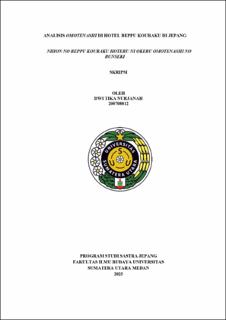| dc.description.abstract | This study analyzes the application of omotenashi, a traditional Japanese service
philosophy at the Beppu Kouraku Hotel, Japan, focusing on its form and use by
employees in each division. This study uses the concept of “face” in the theory of
language politeness proposed by Penelope Brown and Stephen Levinson and
semiotic theory pioneered by Charles Sanders Peirce. The research method used is
descriptive qualitative, namely data collection in the form of words or pictures taken
during an internship at the Beppu Kouraku Hotel in Beppu, Japan so that it does not
emphasize numbers. Data were collected using observation, interview, and
documentation methods. Primary data were collected in the form of photos and
videos of personal experiences taken during the internship at Beppu Kouraku Hotel
in Beppu, Japan. The technique of data analysis uses data collection, data reduction,
data presentation, and conclusion drawing and verification. The study result has
showed that omotenashi, as a Japanese service philosophy, is realized in various
ways according to the functions of each division. The Furonto Division welcomes
guests with Japanese hospitality, ensures a smooth check-in and check-out process,
and provides comprehensive information. The Nakai Division provides
personalized service through serving traditional in-room meals and helping to
prepare futons with attention to detail. Meanwhile, the Housekeeper Division keeps
the rooms clean by ensuring a comfortable and pleasant atmosphere. Overall, the
implementation of omotenashi by the employees of Hotel Beppu Kouraku reflects
the harmonization between Japanese tradition and modern service professionalism,
providing guests with a memorable and wonderful experience. | en_US |


